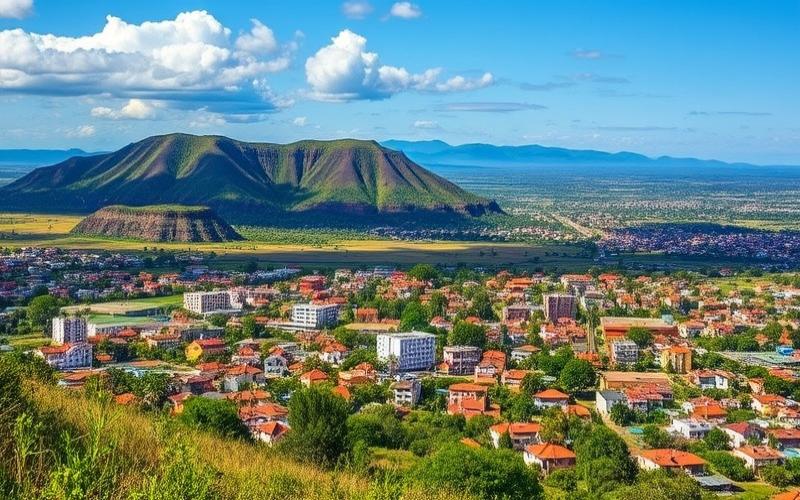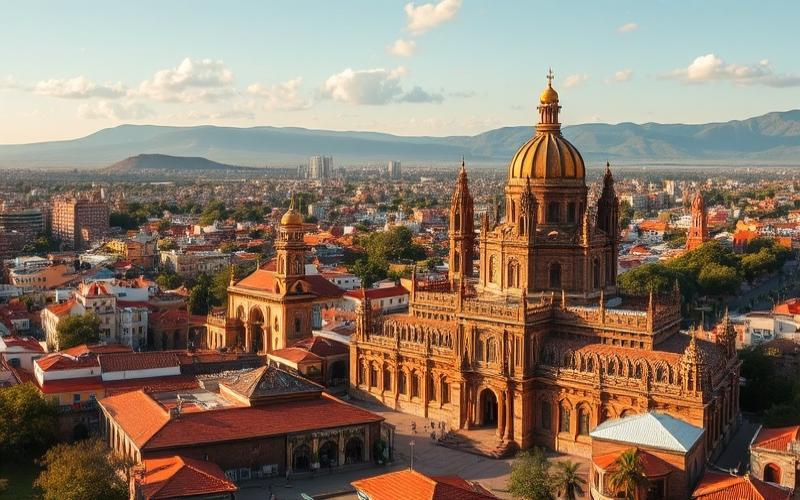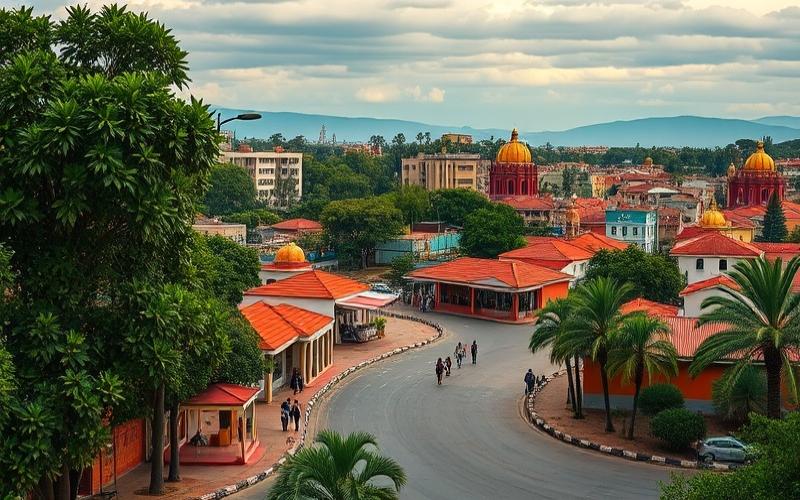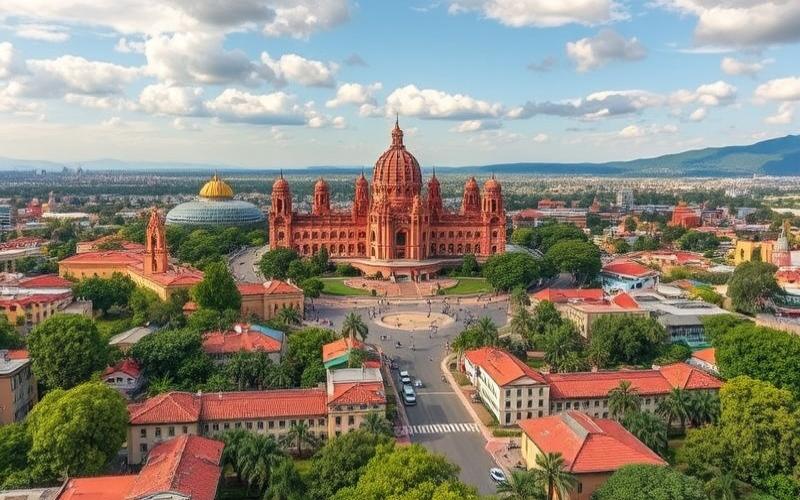
 Published on and written by Cyril Jarnias
Published on and written by Cyril Jarnias
In Madagascar, where the urban housing crisis continues to grow, “micro-apartments” are emerging as an innovative and affordable solution for residents with limited budgets. These compact living spaces, often less than 20 square meters, offer an attractive alternative in a context of soaring real estate prices and dwindling available land for construction.
By focusing on ingenious space optimization and multifunctional furniture, these compact homes could well redefine urban living for a generation of young professionals and students eager to live in the city without breaking the bank.
However, despite their many advantages, these compact-sized apartments also pose challenges in terms of comfort and quality of life, raising questions about how they will integrate into Madagascar’s unique socioeconomic fabric.
The Benefits of Micro-Apartments in Madagascar for Limited Budgets
Micro-apartments in Madagascar offer several major economic advantages, particularly suited to the local context where purchasing power remains limited and demand for affordable housing is high. Their small size allows for significant construction cost reductions, resulting in more accessible rents for tenants. This solution is particularly relevant for young professionals, students, and low-income individuals seeking to live in urban areas without bearing excessive financial burdens.
Favorable Economic Aspects:
- Reduced construction costs due to limited square footage, allowing real estate developers to optimize land and material usage.
- Affordable rents compared to traditional apartments; the micro-apartment economic model specifically targets budget-constrained segments.
- Easier access to housing through the possibility of using microfinance solutions specially adapted for low incomes.
Response to Low-Income Needs:
- Micro-apartments offer a concrete alternative to the chronic shortage of decent housing in Malagasy urban centers.
- They directly meet the expectations of young professionals and students wanting to settle near their place of study or work while controlling their monthly budget.
- By cleverly integrating space (multifunctional furniture, optimized storage), these homes provide access to all essential modern amenities (internet connection, equipped kitchenette) without sacrificing quality of life.
| Advantage | Description |
|---|---|
| Reduced Cost | Cheaper construction than standard apartments |
| Affordable Rent | Adapted to local purchasing power |
| Optimization | Smart use of every square meter |
| Amenities | Modernity despite limited space |
The impact on the Malagasy real estate market is also significant. The proliferation of micro-apartments promotes urban densification while limiting uncontrolled sprawl; thus allowing more efficient and rational use of available land in cities. This model also indirectly helps revitalize certain neighborhoods by attracting a young and active population that contributes to local economic development.
Finally, this new real estate offering creates a virtuous cycle: it stimulates private investment while enabling gradual improvement of the existing rental stock. Both public and private stakeholders therefore find common interest: responding quickly but sustainably to the challenges posed by urban population growth and pressure on affordable housing.
Good to Know:
Micro-apartments in Madagascar represent a significant economic solution for people with limited budgets, particularly due to reduced construction costs and affordable rents. These homes, which maximize available space, offer young professionals and students modern amenities at competitive prices. By optimizing space and efficiently using every square meter, they accommodate residents in a functional setting without sacrificing comfort. Meanwhile, their popularity helps revitalize the local real estate market by promoting urban densification and better use of land resources. This not only meets the growing demand for affordable housing but also encourages more sustainable and residentially efficient urbanization.
Microliving in Madagascar: A Growing Trend
Microliving in Madagascar is experiencing significant growth, driven by several economic and demographic factors. With economic growth of 4.2% in 2024 and projections reaching 4.7% for 2025, the country is seeing new housing solutions emerge that are adapted to the evolving real estate market.
Urban growth constitutes one of the main drivers of this trend, with a constant annual increase in population in urban areas, as confirmed by World Bank data. This rapid urbanization naturally creates pressure on the existing housing stock and stimulates demand for more compact and affordable housing.
Malagasy Micro-Apartments
| Characteristic | Description |
| Size | Typically between 15 and 35 m² |
| Layout | Multifunctional spaces, convertible furniture |
| Location | Primarily in urban centers and dynamic economic zones |
| Price | 30-40% cheaper than standard apartments |
Economic Advantages
- Significant reduction in total acquisition cost thanks to limited square footage
- Lower maintenance fees (heating, electricity, water)
- Reduced common charges
- Potentially reduced property taxes for some eco-friendly projects
Microliving represents a particularly suitable solution for the Malagasy economic context where projected growth of 5.4% in 2025 stimulates real estate development while creating a need for accessible solutions.
This trend is particularly visible in Antananarivo, the capital, where the concentration of economic activities, universities, and professional opportunities attracts many young people. Tamatave (Toamasina) and Majunga (Mahajanga) are also seeing micro-housing projects develop, particularly in their developing port areas.
Local developers like MadaHabitat and GreenLiving Madagascar have positioned themselves in this niche by proposing residential complexes integrating micro-apartments with shared common spaces (laundries, coworking spaces, gardens). The “EcoMicro” project in Antananarivo, comprising 120 units of 20-25m², perfectly illustrates this trend with its ecological and community approach.
Social Advantages
- Enhanced community life thanks to shared spaces
- Reduced ecological footprint
- Greater professional mobility
- Access to property for populations previously excluded
Specific climate constraints in Madagascar, with forecasts indicating below-average rainfall in eastern regions for early 2025, are also pushing developers to design adapted micro-housing, integrating water recovery and optimized natural ventilation.
Good to Know:
Microliving in Madagascar is gaining ground, stimulated by high cost of living, rapid urbanization, and strong demand for economical housing. These micro-apartments, often located in expanding cities like Antananarivo and Tamatave, typically measure between 15 and 30 square meters, and stand out through functional and compact designs optimizing every available centimeter. Developers like “EasyHome” and “City Micro Dwellings” specialize in these projects that offer a practical solution for young professionals and students seeking to reduce expenses while living close to their workplace or studies. Socially and economically, microliving represents a viable alternative, enabling easier access to housing in a difficult economic context, while promoting a simplified and sustainable lifestyle.
Investing in Studios in Madagascar: A Profitable Strategy
Market Potential
Madagascar represents a unique opportunity for real estate investors due to a structural deficit of urban housing, estimated at 800,000 units. This persistent shortage stimulates constant dynamism in construction, particularly in Antananarivo and major cities. Despite uncertain global economic contexts, the real estate sector remains a safe haven and continues to attract capital. Rapid urbanization—with approximately 33% of the population living in urban areas—fuels demand, particularly for affordable housing adapted to young professionals and students. Population growth and urban expansion generate an estimated annual need for more than 130,000 new homes.
Investor Profile
The main investors in the studio segment include:
- Expatriates (approximately 50,000 recorded)
- Emerging Malagasy middle classes
- Students seeking autonomy and proximity to university hubs
- Local landlords seeking quick profitability
- Some foreign groups or diasporas wanting to diversify their portfolio
The rental market attracts through its flexibility: classic long-term rental or short-term rental via digital platforms. This diversity appeals to both individual investors and companies specializing in student or temporary housing.
Economic Advantages
Investing in studios offers several economic strengths:
- Annual rental yields between 7% and 15% depending on location; around 10% in Antananarivo for a standard apartment
- High occupancy rates due to chronic urban housing deficit
- Lower entry cost compared to larger units (single-family house/villa)
Comparative summary:
| Property Type | Average Rental Yield | Occupancy Rate |
|---|---|---|
| Studio/micro-apartment | ~10% | High |
| Family apartment | ~7% | Medium |
| Villa/single-family house | ~5% | Low |
Studios also benefit from simplified management due to their reduced size.
Studio Characteristics
Micro-apartments stand out through:
- Optimized size (15–35 m²) adapted to modest budgets
- Functional design: compact open kitchen, modular sleeping area, integrated storage
- Modern comfort despite small size: private bathroom, possible internet connection
Recent innovations include retractable mezzanines, multifunctional furniture (fold-out sofa bed), movable partitions allowing easy customization according to use.
Typical example:
| Size | Main Rooms | Innovations |
|---|---|---|
| 18–28 m² | Living room/bedroom-kitchen | Mezzanine/storage |
Social and Urban Impact
The proliferation of micro-housing actively contributes to addressing the affordable housing challenge in major Malagasy cities where land pressure is strong. It promotes:
- Managed densification rather than chaotic urban sprawl
- Easier access to city centers for young professionals/students
These solutions thus help revitalize certain neighborhoods while limiting the creation of unregulated precarious housing.
Community benefits:
- Reduction in homeless numbers or families living in unsanitary conditions.
- Local economic stimulation via ancillary activities (cleaning services/restaurants).
- Gradual improvement of urban framework through planned regeneration.
Risks and Challenges
However, investing in this segment carries certain risks that should be considered from the start:
List of main challenges encountered
- Possible real estate market fluctuations linked to unstable national political context.
- Sometimes failing infrastructure: electricity network/drinking water not widespread.
- Administrative rigidity that can slow down some real estate projects.
- Time-consuming rental management if lacking reliable local partners.
Expert testimony:
“The potential is real but you need to surround yourself locally to avoid disappointments related to administrative or technical realities” — Real estate consultant based in Antananarivo
Outlook: With nearly two million additional people expected in cities in the coming years, Madagascar remains fertile ground for those who can combine strategic caution and social innovation in their real estate investments.
Good to Know:
Investing in studios in Madagascar offers an unprecedented opportunity due to rapid urban growth, with increasing demand for affordable housing in cities like Antananarivo, where the urban population is growing by about 4% annually. Investors, both local and foreign, are attracted by high potential rental yields, often exceeding those of larger apartments, due to lower entry costs and strong demand from young professionals and students. Micro-apartments stand out through innovative designs, maximizing space through clever use of modular furniture, making them perfect for tight budgets. They play a key role in relieving pressure on the urban real estate market, promoting sustainable urban development. However, investors should be aware of challenges related to limited infrastructure and real estate market volatility, as highlighted by industry experts.
The Promising Yield of Micro-Apartments by 2025
The micro-apartment market in Madagascar shows promising prospects for 2025, driven by growing demand for affordable housing in urban areas. Competitive pricing, starting at 46 AED (approximately 12.5 USD) for some options, demonstrates financial accessibility that attracts both locals and foreign investors.
The evolution of the post-COVID real estate market has significantly transformed buyer expectations, with a marked preference for optimized and functional spaces. Telecommuting, now embedded in work habits, has redefined residential choice criteria and contributed to rebalancing between urban and rural areas.
| Profitability Factors | Impact on Malagasy Market | International Comparison |
|---|---|---|
| Rapid urbanization | Strong demand in urban centers | Similar to Asian trends |
| Young demographics | Increased need for first homes | Comparable to African emerging markets |
| Growing tourism | High seasonal rental potential | Yields superior to saturated European markets |
| Low acquisition costs | Attractive ROI for investors | Competitive advantage vs Réunion and other islands |
The situation in Madagascar can be put in perspective with that of Réunion, where the Real Estate Observatory noted a growing dichotomy between seller expectations and buyers’ actual purchasing power. While the Réunion market experienced a decrease in supply and an increase in average sales time to 21.27 weeks, Madagascar offers a more dynamic and accessible alternative.
Malagasy government policies now favor small housing through tax incentives and urban development programs, creating an environment conducive to investments in this segment.
- Projected rental yields between 8% and 12% annually
- Estimated capital appreciation of 5-7% per year until 2025
- Real estate portfolio diversification at lower cost
- Usage flexibility (short-term rental, long-term rental, resale)
For investors, taxation is a determining factor in micro-apartment profitability. Similar to French SCPIs which require specific declaration of rental income, income generated by these properties in Madagascar benefits from a favorable tax framework for non-residents.
Attention: Like any real estate investment, market entry timing is crucial. Current data indicates that 2025 represents an optimal opportunity window before probable market saturation in the most sought-after areas.
Good to Know:
In Madagascar, the micro-apartment market is booming with growth projected until 2025, supported by increasing demand for affordable housing solutions in expanding urban areas. Demographic trends, with a growing young and urban population, combined with a developing economy, reinforce this need. Government policies aimed at promoting small housing, particularly through tax incentives, are encouraging more and more investors. Comparatively, in countries like Japan or Germany, micro-apartments have proven lucrative due to high demand in densely populated urban centers. For investors in Madagascar, engaging in this sector can offer attractive returns, given competitive rents and low maintenance costs associated with these compact units.
Disclaimer: The information provided on this website is for informational purposes only and does not constitute financial, legal, or professional advice. We encourage you to consult qualified experts before making any investment, real estate, or expatriation decisions. Although we strive to maintain up-to-date and accurate information, we do not guarantee the completeness, accuracy, or timeliness of the proposed content. As investment and expatriation involve risks, we disclaim any liability for potential losses or damages arising from the use of this site. Your use of this site confirms your acceptance of these terms and your understanding of the associated risks.




















































